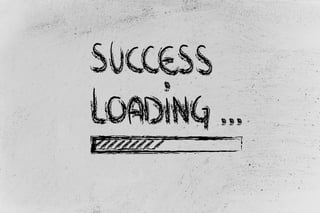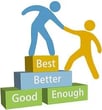How and Why Retail Salespeople Should Create a Personal Brand

Subscribe to our newsletter
Updated April 9, 2024.
What is a personal brand?
A brand stands for something. Think Coke, not cola, or Q-Tip, not cotton swab. A brand tells you what to expect and makes a promise to the consumer.
It's the same for you if you want to stand out from the ordinary in your store.
A personal brand is intentional. It encompasses your attitude about your work, process, and personality and is defined by visibility and the values you portray.
An example of a personal brand
A businessman walks up to a construction site in New York City and asks one of the workers, “What’s your job?” He answers, “I’m a bricklayer.”
The businessman asks another worker doing the identical job the same question. She answers, “I’m building a skyscraper.”
Here’s another example...
I ordered window coverings for my home and gave John 50% down. I had to call and call and call for updates. After 12 weeks, he finally called to leave a brief message: “They’re in.”
That, too, is an example of a personal brand.
Both struck me as authentic. They demonstrated what their brand stands for. Of course, I won’t do business with the window coverings guy again.
While it might be easier to see why branding is important to outside sales representatives, it still is important if you want to make a good living working in retail sales and not be dumped into the same bin as those who fogged a mirror to get a job, picked up the nametag, and left their personality and creativity at the door.
How does branding help?
Most people trust others before they trust brands; that’s why your brand is based on how well you can develop relationships. With most products seen as the same by shoppers, the only difference between those who get more sales and those who don’t is who forms bonds.
A personal brand helps set you apart as someone serious about their industry. It also helps you understand who your customers are and aren’t.
How to define your personal brand:
- Look at the Why of What you Do. What do you like best about it? What motivates you? How do you connect to the products, the environment, and specific customers? Why do you work here and not somewhere else? How are your values aligned with your organization's goals?
- The Way you Do what you Do. Is there some process you use to overdeliver? What do customers thank you for? What specific compliments have you received? What skills or talents are you most proud of?
- Look at Who your Customers have been. What do you notice they have in common?
- Ask your Customers why they come to this store.
- Know your Competition. What are their weaknesses and strengths? After visiting a competitor, why would customers return to you?
Rally your assets
Using an app like Cloze to stay in contact with your best customers is an asset.
If you always follow up on the sales floor, on special orders, or after the sale, that’s an asset.
If you are curious about your industry, attend events, or take special training for the brands you represent, that’s an asset.
If you are a student of human behavior - that’s your biggest asset.
Do you have to come up with a fancy name? No, but you must have a picture in your head of who you are and aren’t. Writing it down is ideal so you can review it daily and refine it as needed.
How to leverage your brand
Come up with how you can help your target customers.
For example, if you are a premium retail shoe salesperson, think, "Why buying the best loafers in the world could be disastrous if you travel a lot." Then, write the article, post the video, and add it to an email.
Survey your customers
What they are looking for they aren’t getting?
Unlike what you might do in the store to discover their pain points, you’re looking at what they want to do with your products, the lifestyle they want to lead, the trends, and the things they didn’t know were crucial to getting more enjoyment from your products.
The more you can keep in front of your customers, the more you’ll stay top-of-mind. Just make sure you post and share relevant information.
Create a blog or video to convey your opinions and ideas succinctly. You need to be able to simplify the complex. You’ll use those in your selling because you’ve worked hard to encapsulate what you want to say.
It could be as simple as demonstrating how leather soles wear out three times faster when wet and what to do about it. Or you might create a video outdoors showing three ways the wrong hiking shoe—the cheapest—can make every step painful.
You decide. You know your customers. No one else does.
Retail salespersons who can brand themselves don’t have to worry about who will walk through the door; they know because they can predict demand.
Use social media
You can leverage social media channels to project your brand - your values, opinions, and advice like never before. And don’t change your tone once you find it or change sides or opinions, or you’ll lose the interest of your target followers.
While marketing yourself, build Facebook ads with your phone number linked to your mobile phone number so you can sell more.
Through it all, you want to put your best face on YOU. This isn’t some fake way to become something you’re not.
If you like to get a laugh from people, like I do, keep it in your writing and messaging. Yes, it’s a fine line.
Your brand is you
That’s why customers and their friends will follow you. You are the same gal or guy they can meet at your shop. There are no disconnects.
That said, if you’re naturally an introvert and only talk in clinical ways about product features, I think you’ll have a tougher time building your brand.
Personal Branding Requires a Personal Connection
Product knowledge, reams of facts, can be found across the internet. Your brand has to be able to compare and contrast and weigh value versus ease of use.
If you help demystify their favorite passions—from cooking to building, painting to watch-collecting, fashion to hiking—people will form a tribe around you.
Limits of personal branding
Your brand can’t be larger than the brand you represent.
For example, if you were a Cartier salesperson, you’d still be a Cartier representative first. Ultimately, your personal brand is backed by the strength of the corporate brand, not the other way around.
If you had a powerful brand, like Kim Kardashian, working on your floor, your products would be secondary or lower behind her personality. It's not a good fit for most retailers.
In my early days in retail, customers followed me from store to store. They knew my brand, what I stood for, and how well I cared for them.
See also: Could It Be The End Of The Road For The Product Knowledge Retail Salesperson?
Why does personal branding matter?
If you’re a sole proprietor, a sales trainer, or a single-service provider, you know how important a personal brand is. Outside of that, you might believe you don’t need to think about it.
Retail represents 1 in 4 jobs in America. Most people who work in stores are willing to jump stores for an extra quarter an hour because they are blah and boring. That makes them interchangeable and oftentimes unpromotable.
Great retail salespeople will take this post, define it, create it, and use it when marketing their brand. They’ll build their following while always looking for the next idea to help their customers.
Zig Ziglar said decades ago, “You can get everything you want in life if you first help others get what they want.”
Thanks for reading this. To create an exceptional customer experience, check out my online retail sales training program, SalesRX.



